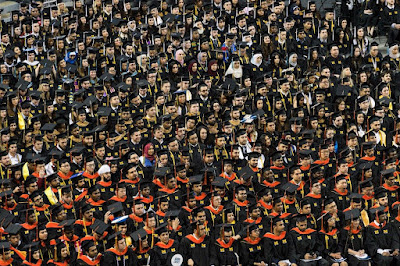Many organizations express the goal of embracing diversity and inclusiveness. This is an admirable goal, but it is often only weakly pursued in practical terms. Efforts towards this end will be stronger in enhancing diversity and inclusiveness if we think carefully about what we have in mind when we think of that better future we are trying to create. Let's think about the inclusive university in particular.
We are a multi-racial, multi-cultural society. The legacies of race and discrimination are heavy upon us. We want the twenty-first century university to be genuinely multi-racial, multi-cultural, multi-religious, and multi-ethnic. We want these “multi’s” because our country itself is multicultural, and because we have a national history that has not done a good job of creating an environment of equality and democracy across racial and ethnic lines. And we want the universities to change, because they are key locations where the values and skills of our future leaders and citizens will be formed. So if universities do not succeed in transforming themselves around the realities of race and difference, we cannot expect the larger society to succeed in this difficult challenge either.
Universities are social environments. We bring with us the stereotypes and attitudes of the society in which we live, which often embody negative assumptions about other groups. And yet we wish to create a community in which students, faculty, and staff are actively accepting of one another, actively interested in learning from each other, and eager to work together on important projects.
We can change the culture and practices of the university in ways that enhance inclusiveness and equality. And if we succeed, our society will become more inclusive and equal as well.
We are creating the future, for better or worse. We have to create the kind of democratic, embracing society we want to live in. We want community, mutual respect, compassion for each other, and a civic culture that values all of us. But this is rarely true in America today.
What is inclusion? It is a social environment that deliberately and actively embodies the idea of mutual respect and concern. It values engagement with others, and it actively facilitates the creation of environments of learning and interaction in which every member feels welcome, equal, and valued. It is an environment that cultivates social trust.
Inclusiveness is more than diversity. It is an institution and culture in which people from all social groups -- race, nationality, gender, sexuality, religion, ethnicity -- are fully embraced and respected. It is an environment in which every individual is afforded the opportunity and space to do his or her best work, unimpeded by stereotype or discriminatory arrangements.
The challenge of creating a truly inclusive university is a difficult one for a variety of reasons. Important among these is the difficulty of overcoming limitations of perspective from the various groups, including especially the majority group. Practices that seem innocuous and neutral to majority group members are often experienced as demeaning and limiting by non-majority group members — what some students now refer to as “micro-aggressions”. In order to improve our university culture we must listen to each other with humility and respect, and we must craft new shared values and new ways of working together across the lines of race, ethnicity, wealth, religion, and gender and sexuality that so often divide us.
A university can be a very different place in twenty years -- more democratic, more inclusive, and more diverse. But to achieve these goals we must embrace new thinking about the challenges that we ourselves create for achieving these ideals. We must be honest and humble in recognizing these challenges.
Working towards these goals is important for many reasons. But perhaps at this time in our history, one of the most important reasons has to do with the currents of racism, xenophobia, and bigotry that have become so prominent in American politics and society in the past decade. Our democracy is weakened by hatred and intolerance. It can be strengthened by a genuine change of collective values -- values that allow us to embrace diversity and inclusion, and to embrace the strengths of our multicultural society.


No comments:
Post a Comment